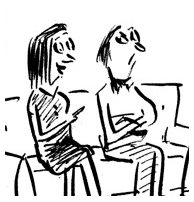
Can it be said enough times? Criticizing, nagging, fault-finding, accusing — these are behaviors that represent the largest predictors of divorce. While partners often nag, criticize and point fingers as a way to ask for help with housework or childcare or to urge a partner to be more responsible with money, it is an ineffective way to communicate needs and wishes. It instead leads to a “shutting down” that deepens resentment, estrangement and disconnection.
If assigning blame, accusing and criticising comprise the kiss of death in a long-term relationship, giving the benefit of the doubt and always assuming the best is the path to a loving connection. A gracious person who treats his partner fairly and respectfully engenders a positive cycle in which the partner will generally (unless s/he is narcissistic) rise to the occasion and justify the former’s faith in him through his own respectful and generous behavior.
Criticism and blame are a form of invalidation. When we focus on the negative and assume the worst of our partners, we diminish their self-esteem in a matter of seconds. Assuming the best and accepting a partner’s style, pace, and even mess-ups is the way we can express faith that our partner is doing the best s/he can at the moment. Ironically, it is this sort of acceptance and validation that inspires a partner to want to change and do better the next time.
This is a good place to add what is perhaps the obvious: Criticism is emotionally tormenting for and damaging to our children as well, making them feel inferior, hurt, unworthy, shamed and guilty, feelings they sometimes carry with them through a lifetime.
* * *
See also: Nagging: Enemy of Love